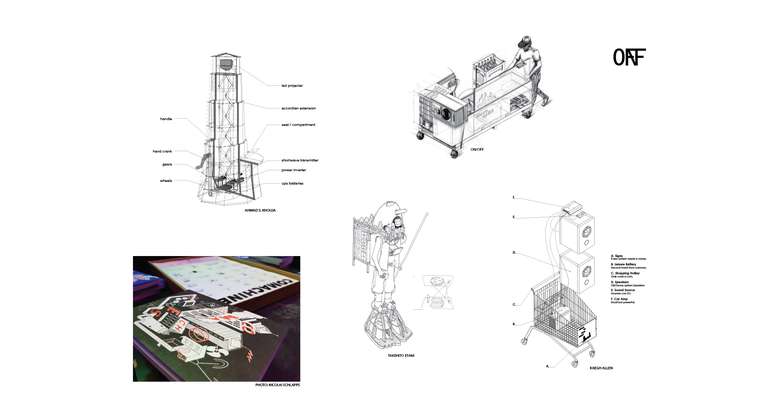Idea by
Dan Dorocic, Mimi Zeiger, Kim Dovey, Alan Smart, Nick Green, Fiona Shipwright, Michael Maginness, Alison Hugill, Diane Barbé, Benni Foerster- Baldenius, Carole Lung, Sam Carvalho
ON/OFF
Call for ideas 2021
Co-machines Book
Co-machines Book

- Systemic changes
Inspired by the recent tendency among architects and designers to opt out of traditional office work in favour of creating self-initiated interventions in public space,‘Co-machines’ maps out a new architectural movement motivated by practices of place-making, occupying and squatting, and alternative economies. Ecological or technological in scope, all the interventions are mobile and nearly all of them are performed without permission from city planners.
Presenting a selection of international projects by emerging designers, ‘Co-machines’ show the life of the alternative, grassroots and DIY with an independent spirit. It seeks out approaches and strategies to complement established urban planning and city-building, and show the beauty and fun in initiative. In a range of ways, ‘Co-machines’ raises questions about the function of architectural permanence, the opportunities for social, ecological, in urban planning and the scope of architecture at large.
Co-machines Book
Co-machines Book

- Systemic changes
Inspired by the recent tendency among architects and designers to opt out of traditional office work in favour of creating self-initiated interventions in public space,‘Co-machines’ maps out a new architectural movement motivated by practices of place-making, occupying and squatting, and alternative economies. Ecological or technological in scope, all the interventions are mobile and nearly all of them are performed without permission from city planners.
Presenting a selection of international projects by emerging designers, ‘Co-machines’ show the life of the alternative, grassroots and DIY with an independent spirit. It seeks out approaches and strategies to complement established urban planning and city-building, and show the beauty and fun in initiative. In a range of ways, ‘Co-machines’ raises questions about the function of architectural permanence, the opportunities for social, ecological, in urban planning and the scope of architecture at large.